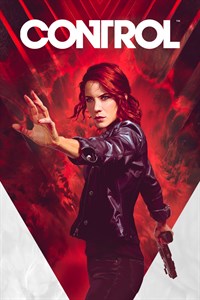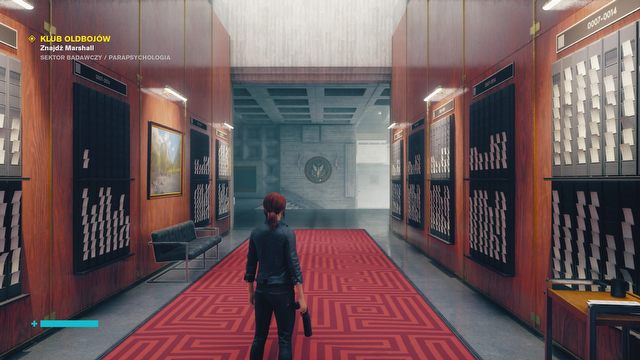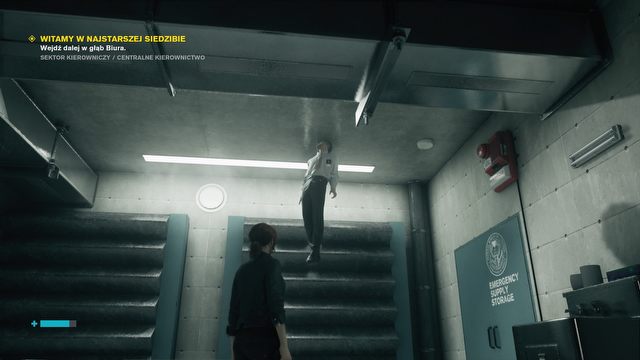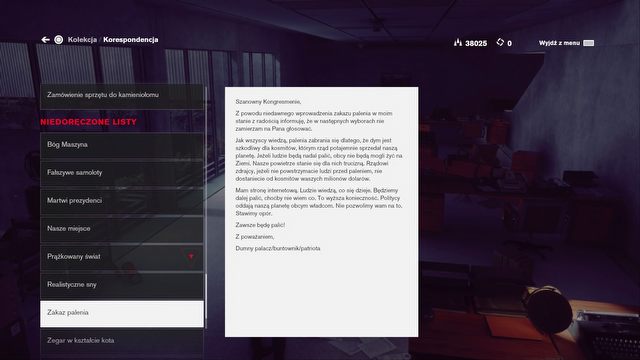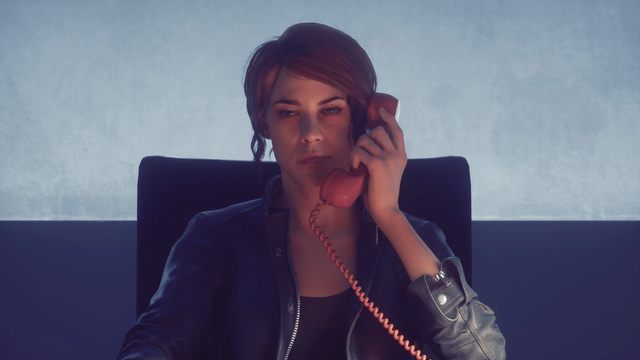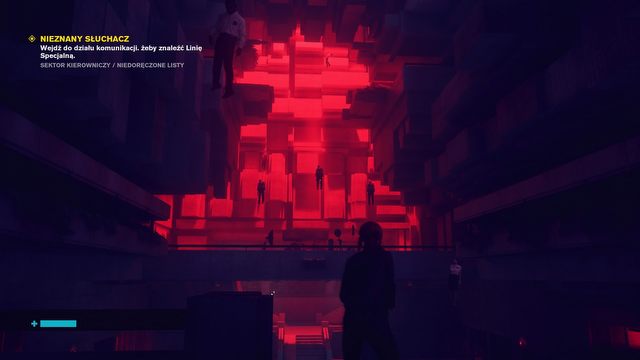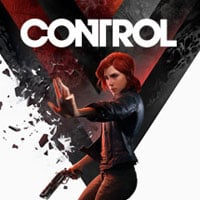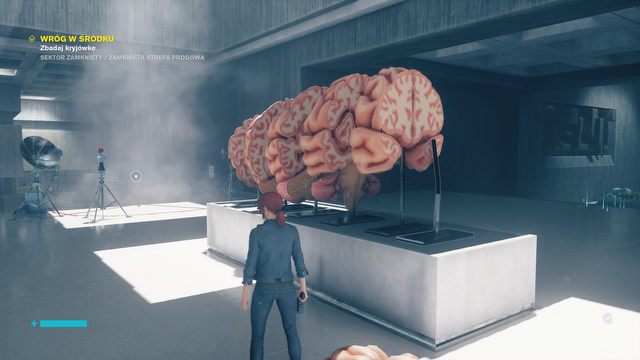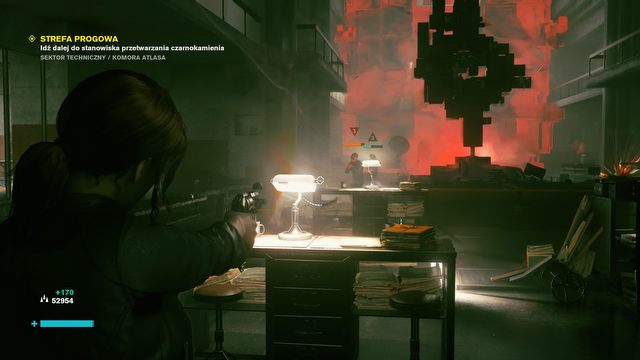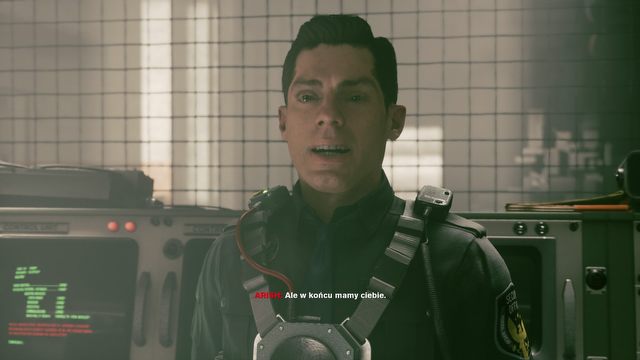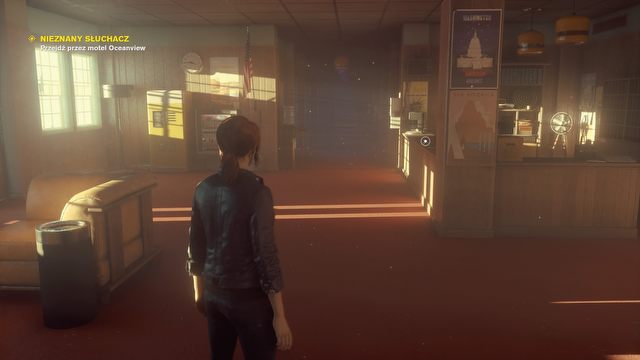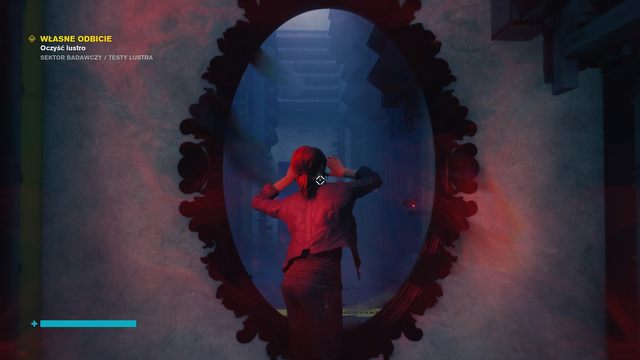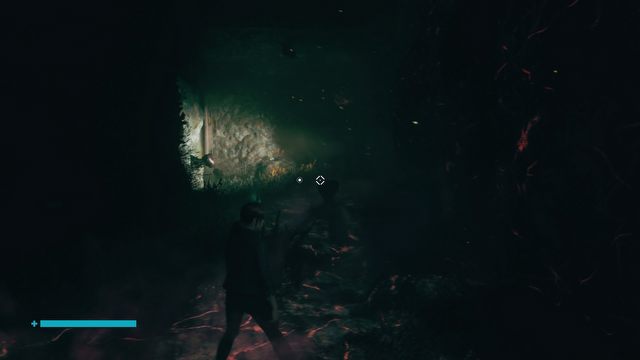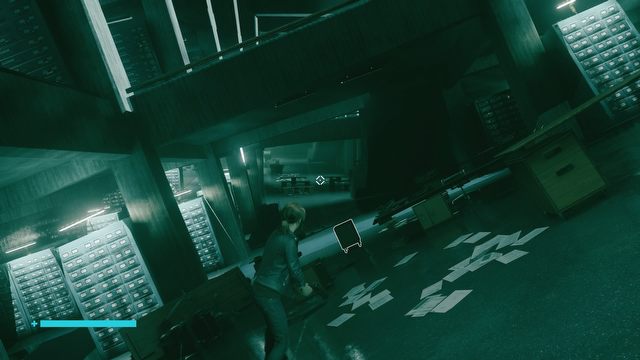If You Think Control is not Worth it – Think Again
The latest game by the creators of Max Payne and Alan Wake hasn't been hugely exciting before the release, which is a pity – because it's definitely more than just a solid shooter.
The review is based on the PS4 version. It's also relevant to XONE version(s).
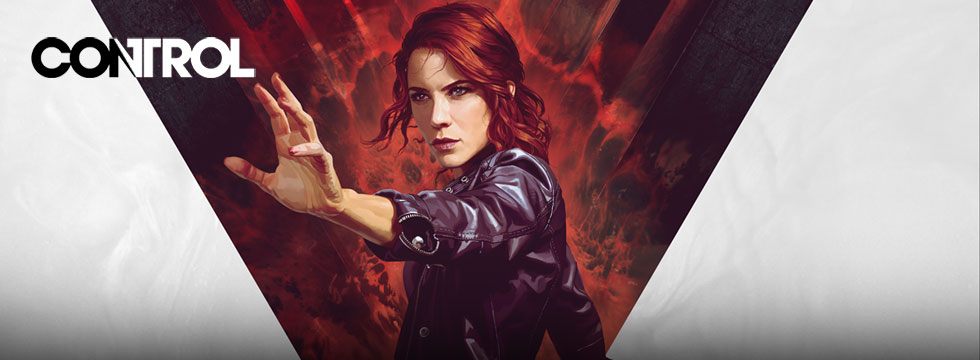
If you're asking what Control is, I'm not surprised. I can say this game was a vague, little dot on my radar for a while now — if it were not for one of my colleagues, who fell in love with the game after the E3, I probably still wouldn't give much damn about it. And that would be a mistake. Because it's not just some new action game from Max Payne's creators, a typical holiday time-filler, but something much more compelling.
- X-Files without Mulder, in the atmosphere of David Lynch's movies;
- the first game in which I read almost all the notes I found;
- Prey, but in TPP, less scary, and brighter;
- a game about superheroes with no leather skin and latex involved –
- the title of which doesn't really say anything unless you play it yourself;
- finally, a game that seems to be yelling "GIVE ME NEXT-GEN!"
Federal Bureau of Madness
- finely constructed, disturbing atmosphere;
- a decent story in a great setting;
- cool combat mechanics — throwing objects at enemies is super fun;
- good cut-scenes and vids;
- demanding optional bosses;
- some really gripping moments (Ashtray Maze <3);
- fantastic exploration that rewards inquisitive players;
- more than a dozen hours of the main thread completed with as much side quests.
- clinically unremarkable appearance of most locations; same goes for dialogues and animations of NPCs;
- poor optimization of the review copy on a regular PS4 screams "GIVE ME PS5!"
- a few other shortcomings (e.g. the game is very dark sometimes, but there's no flashlight; long loading screens).
Control does not waste time on unnecessary introductions and begins with a bang. A moment later, when we pick up a weapon (not just a gun, but a shape-shifting, multi-purpose servos weapon — more about that below), we will head the Federal Bureau of Control, and all its employees will address us as "director." Yes, a girl from the street becomes the head of a secret American institution just like that — and this is only the beginning of the unlikely events that will unfold during this adventure. I don't want to spoil anything, because discovering the next secrets of Control is just part of the fun. All you have to know is that we get to the HQ of the FBC in New York – which is also referred to as the Oldest Facility – in a very difficult moment: the institution has been attacked and paralyzed by a powerful, mysterious force – the Hiss. Our job is to regain control of the FBC, and to find out the cause of all this madness.
If I were to mention the one thing that made the greatest impression on me, it would be the atmosphere. Which is a cliche, but hear me out. You enter a spacious office room. All clinically white, bright, blinding lamps, solid desks and, of course, people. They levitate high above the ground, paralyzed. In the background, we can hear their quiet mumbling, reminiscent of white noise — some words, sometimes fragments of sentences; once quieter, once louder. Suddenly, poles of sharp, red light appear, and with them – enemies — people captured by the mysterious and sinister Hiss. Or rather, their grotesque versions – sometimes twisted, sometimes flying, but always angry and hostile. It makes quite an impression. As we travel through empty spaces with levitating office staff and strange babbling in the background, the feeling of walking a nightmare is undeniable.
Just so you're clear — Control is not scary in the regular sense. Sure, the atmosphere is very disturbing, so once or twice I startled in the chair, but it's far from your regular horror game. This game hits other notes — the atmosphere is reminiscent of Rosemary's Baby, a film in which most of the time everything seems fine, but we can just feel that something is VERY wrong.
It's impossible to talk about the atmosphere without the second biggest advantage of this game — its quaint universe. This is one of those stories where our world turns out to be something completely different than everyone thought. It reminded me of a spoof of the X-Files with Twin Peaks. While the plot isn't jaw-dropping, it's alright, and discovering the secrets of the Federal Bureau of Control is a lot of fun. It actually led me to a slight obsession — for the first time in any game, I read almost all the notes or documents that Control shares very generously with us. Contrary to appearances, the game world turns out to be very rich, and after the finale, it still has a lot of secrets to offer. This is also the perfect foundation for Control 2 — I only hope that Remedy goes for it. But let's go back to the beginnings.
Physics for A+
Meet Jesse Faden. Jesse is the director of the Federal Bureau of Control, wears a leather jacket and can levitate. Yeah, in Control, we're getting a few skills that would make the Avengers blush with envy. Flinging objects torn out walls (I recommend fire extinguishers — they explode beautifully upon impact), levitation, or lightning-fast evasions are the powers that make the game from Remedy perhaps the best sort-of-superhero game of 2019. True, the competition wasn't the strongest, practically limited to the average Marvel Ultimate Alliance 3, but so what? Jesse doesn't wear a tight outfit, but she's gaining more and more wicked skills that open up new options every now and then. Quite literally, because they allow to get to places that were initially inaccessible to us — in a typical metroidvania way.
The fun of using these powers is different, though — fast dodging is so obviously classic that you don't have to add anything else, levitation is a little meh and it has nothing on Anthem's flying, but control over the objects makes up for all the shortcomings. The realistic representation of physics in this game is an absolute masterpiece! First of all, we feel its full naturalness — grabbing a table will topple the chairs around it, and all the items on it will fall off. When we rip a fire extinguisher out of the wall and there is an enemy between us and it, the object will hit the enemy on the fly (first we pull the object to ourselves, and then we can fire it at any target).
Heavier items break away from the ground noticeably more slowly, so they feel like they weigh more and can hit several enemies at once — their bodies react to the hit extremely realistically, which is a rare sight in games. Thanks to all this, the feeling of ramming a monster possessed by the Hiss with a bulky office desk or a boulder is fantastic. I really almost spammed these attacks — it was so fun.
AN OBLIGATORY DOSE OF RPG
It's hard to imagine a modern action game without RPG elements, isn't it? Control maintains this trend — during the game, we discover new powers, and then we can upgrade them or our character with skill points. For example, levitation cannot only last a bit longer, but it can also allow you to deal damage to surrounding enemies by slamming into the ground after obtaining the skill.
Visit this room again, Jesse.
Control is not a sandbox (which you might always expect from modern games). However, its also not a linear experience the like of Uncharted, in which the entire experience is heavily scripted and prepared in advance. In one sentence, I would describe this game as a combination of Resident Evil 2 with metroidvania. Quite soon after the start of the game, a map of the Federal Bureau of Control, divided into several floors, becomes available. Nothing prevents you from traveling on all of them, or even performing side quests, for some time letting go of the main thread. So, we run freely through different sectors, fight against opponents and look for interesting places. And there are quite a few of these.
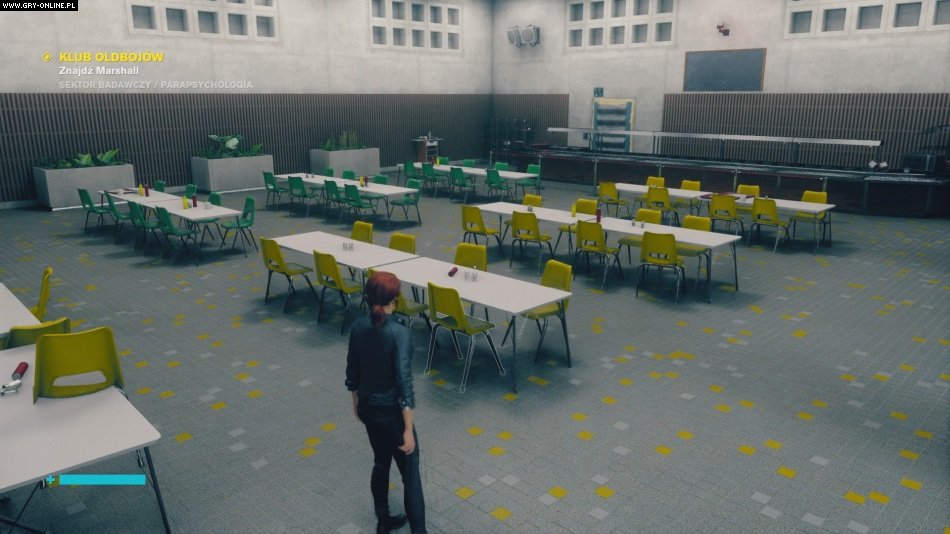
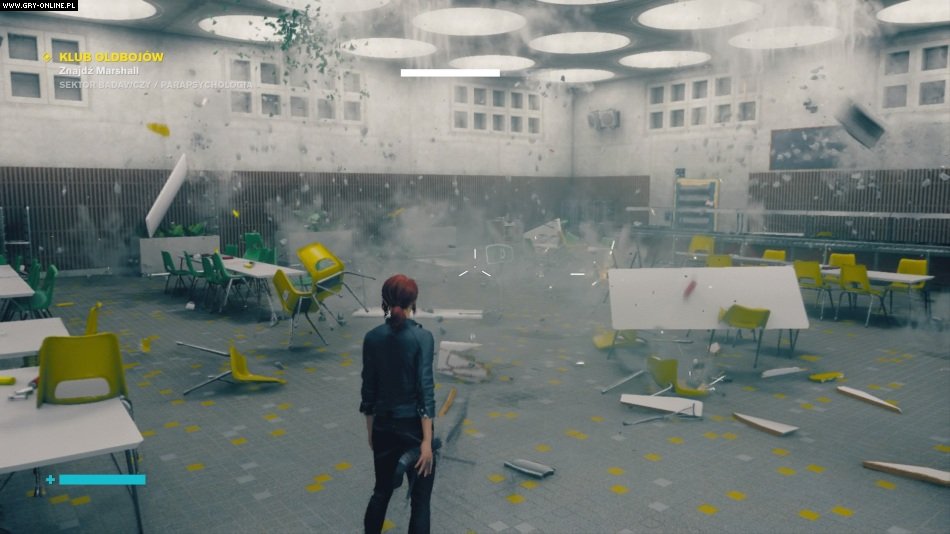
You can vent off on the surroundings.
If you like games where exploration is fun, you'll also enjoy exploring the mysterious FBC headquarters. Every now and then, we unlock new sections or rooms, and long after completing the main thread and most of the additional quests, I discovered places or interesting side missions, which I had simply missed. In the rooms, I usually found only containers with materials for simple crafting, or new documents to read – and developers tend to forget about such a simple way of rewarding inquisitive players. I also found a couple of hidden rooms, whether by smashing walls, or flying there using one of the last powers that Jesse gets. There are still places in the game that I can't reach — and it can be done almost certainly.
NO EASY WAY, YOU GOTTA LOOK
I almost missed a very interesting side mission — if I hadn't talked to other players, I might never know about it. To activate it, you need to pick up a piece of paper in some insignificant room. I haven't seen a game that would reward curious players who like to “kiss” the walls — and after all these games leading us by the hand, it's a very refreshing experience.
Hardcore oldshool
Control is a difficult game. The story campaign tells you exactly what to do most of the time — a few instances, you might need to consult a guide, because some puzzles are really complicated, and some opponents are pretty challenging — but side quests are a completely different pair of shoes. The developers clearly created them for people who really enjoy the game. Most of the additional quests are unlocked after the story ends, and they come with the same quality as the main storyline, which deserves praise. These are not the typical time-fillers that some studios are some keen on including in their games.
SPECIAL-PURPOSE GUN
There's only one weapon in Control, oddly enough. The service weapon, as it's called, can only be worn by the director of the facility — on the same principle as only Thor can lift his hammer. Fortunately, the gun can behave in many different ways — it can shoot like a revolver, and spit bullets like an automatic rifle. It can even become a sort of a railgun. It actually even prints its own ammunition — unfortunately, fries aren't included in the service.
Another interesting thing about the side quests is that they're so old school, I felt like I went back way back in time. For example, there's a mission where you have to kill the bearers of mold. All you know is where to find them, but some of the rooms in the building are big halls, full of smaller rooms or nooks, and there are no more precise clues. So, you read the description of the task several times – maybe you've missed something? – you walk around the map and look for traces — for example, mold that overgrows the door. If you notice it, you can go through. There were times when I was totally baffled, kissing all the walls, unable to find the object I was looking for. Well, it's optional fun for the most ardent gamers.
The approach to the fast travel system is also pretty old-school — we can only do it in places we have previously unlocked, and there are not so many of them. As a result, we do a fair amount of backtracking in the game, roaming the rooms, which we slowly learn by heart.
I already wrote that Control reminds me of Resident Evil or Prey, but there's more. Dark Souls has become a standard benchmark for old-school titles. And it makes perfect sense. There are a few more powerful bosses in the game — and getting them killed isn't easy at all. In addition, when we die, we return to the respawn, which, again, sometimes means a lot of backtracking, sometimes with additional opponents along the way.
Hi, Max
Control was created by the people responsible for Max Payne, and there's no lack of references to that game here. The writer and author of the original concept is Sam Lake himself – the face, and the writer, of “Maximum Pain” and his story. Max' voice is often heard, too, since actor James McCaffrey voices one of the NPCs in this game. What's more, the protagonist talks to herself a lot — just like the former cop. Even the elevators at the FBC headquarters were created by a company with a strangely familiar name – Paine Elevations.
These bosses aren't as difficult as those from Sekiro, but I've had a hard time with some of them. Their health bars are miles long, they can deliver several different attacks, sometimes in a couple of phases, and you should prepare to fight them by choosing the right buffs — and then learn from your mistakes. Dying wasn't the real problem with boss fights, but rather the game-over screens and reloading of the game, which does take a while. In consequence, it sometimes took more time for me to reach the boss than to fight it, especially if it was particularily strong.
Are you looking for extreme challenges? Then try to solve the puzzle with the cards without the help of a guide. Control isn't very helpful when it comes to puzzles, so you have rack your brains hard in a few places.
Where's my FPSes?
“It sucks they didn't sort out the optimization. It could have been game of the year otherwise,” my friend wrote to me about Control. Unfortunately, that's entirely true – optimization is one of the elements, where the devs didn't deliver. The great recreation of physics, which I wrote about earlier, has a dark side — inside rooms with many small objects, the framerate can plummet brutally. All sorts of small objects flying around the rooms are just slaughtering the basic version of the PS4. At times, the system was so stressed in fact, that the game was unplayable, reaching the valleys of performance death at around 15 FPS. Fortunately, these moments don't lead to a significant combat disadvantage. So these troubles were irritating, but not prohibitive — not once did I die due to low framerate.
WHAT ABOUT THE PC?
As a person who prefers the PC, I play Control on my computer, and so far I spent about 7 hours in the game. Most of the time everything worked well, but I've had 15 (!) crashes of the game, which could be recreated by simply going to the same places on the map. There have been occasional drops in framerates, but only during physics-intensive skirmishes. According to the developers, the review copy of the game already included Day 1 Patch.
Hardware:
- GPU: Asus Strix GTX 1080
- CPI: Intel i5-8600K
- RAM: 16GB
- Resolution: 2560x1080 (21:9)
- Settings preset: high
It is ironic that such lack of control also happens in several other aspects of Control. Regular FPS drops can be seen not only during major battles, but also after loading the game, or after using fast travel. The map and inventory screens also have a weird lag sometimes. Can you live with that? Yeah, but it's annoying. This is just another signal that the current generation of consoles is becoming obsolete. Brightness is also strange — in some places it's really dark, and the creators have forgotten about adding a flashlight. I'm sure players will demand that it be added in an update. We can brighten the screen, but it helps to a small extent, and spoils colors and contrast. As a result, I played much of the game with overexposed image, which wasn't pretty. I haven't noticed such a problem in any game in a long time.
TESTERS, GET TO WORK!
Cinematar Control location requires corrections. The reviewer version was probably not tested, because the number of stupid mistakes, including factual ones, unfortunately is noticeable. I hope this will be fixed by the premiere.
Playing is more fun than watching
Anyone can certainly name a few games, which are way more fun played than watched. Control is one of these games — looks rather unassuming on videos. Why is it? I'd say the interior design in the bureau is just bland, the colors pretty cold. It all fits and is thoughtful, sure, but it looks uninspired at first glance.But Control has this thing that makes me want to play it even now, when writing those words. Maybe the plot may didn't leave me speechless, maybe the protagonist is just OK, and the NPCs were mostly unremarkable, but the disturbing atmosphere, the warped universe, and some great moments (Ashtray Maze is a candidate for the gaming moment of the year, for sure!) more than make up for it.
I also talked about Control, with Alban, the author of the guide to the game, and he wrote “I had a little break from the game, and I'd like to go back and play again, look for new challenges, etc. And for me that always means the game was really great.” So, if someone still has doubts about whether to play — we, the editors of gamepressure.com answer in univocally: go and play!
ABOUT THE AUTHOR
I spent over 25 hours in Control, with the main storyline taking about half of that time. I have barely a couple of side quests left — including a few rather unpleasant bosses (I recommend a group meeting with dr. Tomassi.) I'm assuming getting a platinum will take about 10 hours more.
DISCLAIMER
We received a copy of Control for PS4 free of charge from its Polish publisher, CDP.
Control
If You Think Control is not Worth it – Think Again
The latest game by the creators of Max Payne and Alan Wake hasn't been hugely exciting before the release, which is a pity – because it's definitely more than just a solid shooter.
